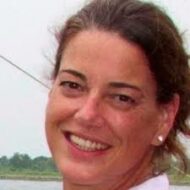Pathogen Sharing: The Unspoken Condition for Pandemic Preparedness & Response
Date
4 May 2022
Time
12:30-14:00
Location
The International Conference Centre, Rue de Varembé 17, 1202 Genève
Attendance
This event has now passed. To browse our upcoming events click here.
How can we reconcile the public health objective of eradicating deadly pathogens and the environmental objective to protect biodiversity?
The COVID19 pandemic has highlighted the importance of sharing genomic information swiftly and widely. As governments negotiate the details around a potential new global instrument to improve how the world should prepare and respond to future pandemics, it is critical that they consider the unintended consequences of international environmental agreements meant to preserve the world’s genetic resources and in particular, their potential impact on pathogen sharing in future epidemics and pandemics.
The event is moderated by Emma Ross, Chatham House Fellow. Speakers include:
- Jacqueline Castille, Nagoya Protocol and Access Benefit Sharing Global Leader, Boehringer Ingelheim
- Thomas Cueni, Director General, International Federation of Pharmaceutical Manufacturers and Associations, Switzerland
- David Heymann, Professor of Infectious Disease Epidemiology at London School of Hygiene and Tropical Medicine and former Head of the Centre on Global Health Security at Chatham House, London, UK
- Catherine McCarthy, Regulatory Compliance Manager, Wellcome Sanger Institute, UK
- John McCauley, Director, World Influenza Centre, The Francis Crick Institute, UK
Don’t miss this unique opportunity to hear from scientists and experts on the importance of pathogen sharing, which is vital for global health security.
Event recording
Address
The International Conference Centre, Rue de Varembé 17, 1202 Genève
Speakers

Emma Ross is the Senior Research Fellow in Chatham House’s Global Health Programme, where she leads the Institute’s health security portfolio.
Her research has focused on infectious disease control, including leading a weekly virtual expert panel discussion series on the COVID-19 pandemic; assessing global solidarity in responding to the pandemic; evaluating the approach to command & control of the 2014-2016 Ebola epidemic in Sierra Leone, considerations for building sustainable laboratories in Africa and options for strengthening transnational public health data sharing for greater health security.
She has also been for more than a decade the Managing Editor of the Control of Communicable Diseases Manual (CCDM), a leading reference book on infectious diseases for public health specialists and epidemiologists that is updated on a rolling basis.
Prior to working at Chatham House, she headed news operations at the World Health Organization headquarters in Geneva, after serving as a long-time medical correspondent at the Associated Press, for whom she reported from the frontlines of many of the major international health stories coming out of Europe, Africa and Asia – from outbreaks, global health challenges and debates in public health policy and medical ethics to advances in science and medicine.
She has a master’s degree in journalism from Northwestern University in the United States.

Jacqueline Castille is the Global Leader of the Nagoya Protocol & Access and Benefit Sharing initiative for the Boehringer Ingelheim Group, ensuring the overall adherence to the related regulations requirements. Within this role, she represents the Company at the IFPMA strategic groups dedicated to these topics. She is also Senior Contract Manager for the French and Dutch Research and Development teams of Boehringer Ingelheim Animal Health, managing the implementation and the follow-up of some project-related agreements with external partners.
Jacqueline has a business school diploma and a French University degree (Master) in Intellectual property strategy and Innovation.
Boehringer Ingelheim is working on breakthrough therapies that transform lives, today and for generations to come. As a leading research-driven biopharmaceutical company, the company creates value through innovation in areas of high unmet medical need. Founded in 1885 and family-owned ever since, Boehringer Ingelheim takes a long-term perspective. More than 52,000 employees serve over 130 markets in the three business areas, Human Pharma, Animal Health, and Biopharmaceutical Contract Manufacturing.

As Director General, Thomas leads IFPMA’s mission to encourage the development of sustainable solutions that enable innovation and improve global health.
Over the past two decades, Thomas has been instrumental in developing collaborative solutions for some of the greatest global health challenges. These include HIV/AIDS and antimicrobial resistance, as well as the industry’s response to pandemics.
He is frequently called upon to comment on industry’s contribution to global health in the world media and at international fora.
Since he joined IFPMA, Thomas has pioneered collaborative solutions to tackle antimicrobial resistance (AMR), chairing the AMR Industry Alliance and launching the AMR Action Fund. This is a USD 1 billion venture begun in July 2020 to fund the development of between two and four new antibiotics by 2030.
Thomas represents the innovative pharmaceutical industry in the Access to COVID-19 Tools (ACT) Accelerator initiative, set up in April 2019. In 2022, together with industry CEOs and building on the lessons learned from COVID-19, he led the development of the Berlin Declaration. This is a vision for equitable access in global pandemic response that invites multilateral organizations as well as the G7 and G20 to agree to a social contract for future health security.
He is Chair of the Business at OECD Health Committee and serves as Industry Co-Chair of the APEC Biopharmaceutical Working Group on Ethics.

David Heymann is a medical epidemiologist and Professor of Infectious Disease Epidemiology at LSHTM, is a distinguished fellow at the Centre on Universal Health at Chatham House (London), and was chairman of the board of Public Health England from 2009 – 2015.
From 1989 to 2009 he held various leadership positions in infectious diseases at WHO, and in 2003 headed the WHO global response to SARS in his role as executive director of communicable diseases.
In 1976, after spending two years working in India on smallpox eradication, Heymann was a member of the CDC (Atlanta) team to investigate the first Ebola outbreak in DRC and stayed on in sub-Saharan Africa for 13 years in various field research positions on Ebola, monkeypox, Lassa Fever, malaria and other tropical diseases.
Heymann has published over 250 peer reviewed articles and book chapters, is editor of the Control of Communicable Diseases Manual, and is an elected member of the UK Academy of Medical Sciences and the US National Academy of Medicine.

Catherine McCarthy is Regulatory Compliance Manager at the Wellcome Sanger Institute in the UK. The Institute is one of the premier centres of genomic discovery and understand in the world. It forms ambitious collaborations globally to provide the foundations for further research and transformative healthcare innovations.
Pertinent areas of work comprise global-scale, pathogen surveillance programmes with vital aims of providing centres of disease control within endemic countries with real-time, implementable genetic information to combat the spread of disease.
Catherine’s focus and expertise is compliance with Access and Benefit Sharing (ABS) legislation world-wide and enabling the legal and ethical acquisition of genetic resources accessed as part of research that the Institute undertakes. Remaining abreast of such a current and fast-moving subject area including its implementation presents its challenges but also great opportunity to shape the future.

Dr John McCauley is Director of the Worldwide Influenza Centre at the Francis Crick Institute in London.
The Centre is one of the seven WHO Collaborating Centres for Influenza and forms part of the WHO Global Influenza Surveillance and Response System (GISRS). Much of the work of the Centre is directed to monitoring the genetic, antigenic and drug resistance properties of virus samples from WHO National Influenza Centres from across the globe. Together with the other WHO Collaborating Centres for Influenza WHO recommendations are made twice-yearly for the composition for seasonal influenza vaccines and for the development of vaccine viruses from zoonotic influenza viruses for pandemic preparedness purposes.
The Francis Crick Institute was formed in 2015 and the MRC National Institute for Medical Research (NIMR) became part of the Francis Crick Institute in April 2015. NIMR had worked with WHO on influenza since 1947 when, with WHO, a World Influenza Centre (WIC) was established. WIC was one of the two founding Collaborating Centres in the WHO Global Influenza Surveillance Network, now GISRS.
Prior to working at NIMR John McCauley was a group leader at the Institute for Animal Health in the UK, where he worked on influenza viruses of animals, Bovine Viral Diarrhoea Virus and Swine Vesicular Disease Virus.


